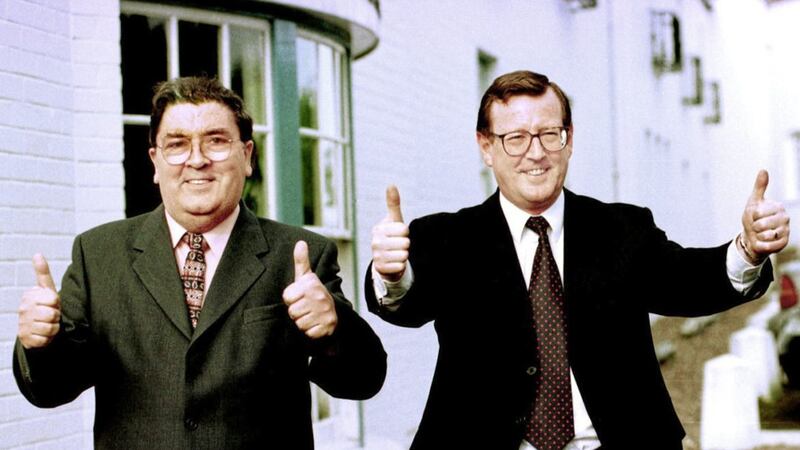ACCEPTING his Nobel Prize for Peace, John Hume said: "Once these institutions are in place and we begin to work together in our very substantial common interests, the real healing process will begin and we will erode the distrust and prejudices of our past and our new society will evolve, based on agreement and respect for diversity.
"The identities of both sections of our people will be respected and there will be no victory for either side...
"We must now shape a future of change that will be truly radical and that will offer a focus for real unity of purpose: harnessing new forces of idealism and commitment for the benefit of Ireland and all its people."
The curse of a speech, however good it may have sounded at the time, is that events curdle the optimism, leaving you with a brutal, unexpected reality.
No healing process has begun here, real or otherwise. We haven't eroded the distrust and prejudices of our past; indeed, we haven't even addressed them at all.
The most substantial interests we have in common are mutual distrust wrapped in mutual suspicion.
None of this is John Hume's fault; although I sometimes wonder if things would have been different if he and Trimble - rather than Trimble and Seamus Mallon - had taken the joint mantle of first and deputy first minister in 1998.
Leaving it to his deputy gave the impression that he wasn't entirely committed to the process and institutions he had helped to create.
And, given the fact that the election to the new Assembly in June 1998 saw the SDLP emerge, for the first time ever, as the lead party - although the vagaries of the PR system meant they slipped four seats behind the UUP - it seemed odd that Hume, to all intents and purposes, chose to take a back seat at a key moment.
Maybe he had looked closely at the figures on the unionist side of the Assembly and realised that there wasn't, in fact, a solid pro-Agreement majority.
David Trimble, in a piece written for the Fordham International Law Journal in April 1999 - a special edition dedicated to the Analysis of the Northern Ireland Peace Agreement - noted: "The transitional period has thrown up many problems, most of which, at the time of writing, have been resolved.
"I believe that the remaining problems will also be resolved, even if we cannot now predict precisely how and when that will happen.
"I also believe, whatever happens to the Agreement or particular aspects of it, that on April 10 1998, society in Northern Ireland turned the corner and things can now only get better."
Like Hume's speech, Trimble's optimism was also curdled by events.
As were the speeches made by Ian Paisley, Martin McGuinness and Tony Blair in May 2007, trumpeting the deal between Sinn Féin and the DUP, the birth of the Chuckle Brothers relationship and a 'new stability and harmony at the heart of politics'.
All that hope in 1998 and 2007 turned to dust. All that optimism curdled. All the fine words and 'look-at-us-look-at-us' boasting ground into mere confetti.
Why am I telling you this? Because it's long past the time that people realised that hope alone doesn't cut it in the big bad world.
Hope always needs to be shored up with hard work and then more hard work. Hope relies on good will, integrity, common purpose and compromise if it is to be translated into something solid and lasting.
Hume ended his speech with a line from Louis MacNiece: "By a high star our course is set. Our end is life. Put out to sea."
But there are no guiding stars in our particular firmament and no sea on which to sail. Our ship is holed and grounded and the last remaining compasses rusted beyond use and reliability.
Hope, to paraphrase someone or other, is a good supper, but a crap breakfast.
There could, of course, be an executive tomorrow. All it requires is for the parties - the DUP and SF in particular - to erase all red lines and pre-conditions, appoint ministers and start making decisions on health, education, infrastructure et al.
Farm out the areas of disagreement to something like a rebooted Civic Forum and ask it to produce reports twice a year.
But that won't happen: and it won't happen because that requires genuine compromise and an appreciation of their biggest responsibility - which is that of providing day-to-day government and looking after all of our people.
It's called hard work. But hey, why bother with the hard work of a functioning, accountable government when you can get much the same salary and expenses for re-enacting Miss Havisham's wedding day?








